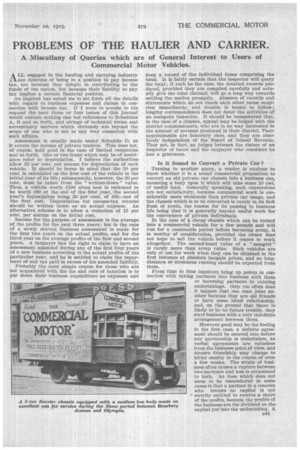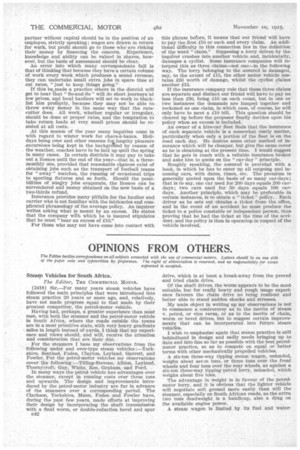PROBLEMS OF THE HAULIER AND CARRIER.
Page 25

Page 26

If you've noticed an error in this article please click here to report it so we can fix it.
A Miscellany of Queries which are of General Interest to Users of Commercial Motor Vehicles.
ALL engaged in the hauling and carrying industry are desirous of being in a position to pay income tax, not because they delight in contributing to the funds of the nation, but because their liability to pay tax implies a certain financial position.
An inquirer has asked me to set forth all the details with regard to business expenses and claims in connection with income tax. If I were to accede to his request the next three or four issues of this journal would contain nothing else but references to Schedules A, B and so forth, and strings of technical terms and accountancy matters which obviously are beyond the scope of one who is not in any way connected with such affairs.
Assessment is usually made under Schedule D, as It covers the income of private traders. This does not, of courSe, hold good in the case of limited companies and so forth. One or two items which may be of assistance refer to depreciation. I believe the authorities allow 20 per cent. per annum for depreciation of each vehicle. It should be borne in mind that the 20 per cent. is calculated on the first cost of the vehicle in the initial year of its life; subsequently, however, the 20 per cent, must be taken from the " written-down " value. Thus, a vehicle worth £100 when new is reckoned to be worth £80 at the end of the first year, the second year's depreciation being 20 per cent. of £80—not of the first cost. Depreciation for income-tax returns Should be written down as an actual expense. An alternative scheme is to allow a reduction of 15 per cent. per annum on the initial cost.
Income for the purpose of assessment is the average of the profits for the past three years ; but in the case of a newly started business assessment is made for the first two years on the actual profits, and for the third year on the average profits of the first and second years. A taxpayer has the right to claim to have an assessment •aniended during any of the first four years of a new business according to the actual profits of the particular year, and he is entitled to claim the repayment of any tax paid in excess of his amended liability. Probably the most simple course for those who are not acquainted with the ins and outs of taxation is to put down their business expenditure as expenses and
keep a record of the individual items comprising the ' total. It is fairly certain that the inspector will query the total; if such be the ease, the detailed records produced, provided they are compiled carefully and actually give the total claimed, will go a long way towards settling the matter promptly. Absence of records and statements which do not cheek each other cause suspicion immediately, and trouble is bound to follow ; lengthy correspondence does not deter the activities of an energetic inspector. It should be remembered that, in the case of a dispute, appeal may be lodged with the district commissioners, who are in no way interested in the amount of revenue produced in their district. Their appointments are honorary ones, and they are absolutely indep4ndent of the Board of Inland Revenue. They act, in fact, as judges between the claims of an inspector of taxes and the taxpayer who considers he has a grievance.
Is it Sound to Convert a Private Car ?
Turning to another query, a reader is anxious to know whether it is a sound commercial proposition to convert an old private car chassis into a business one, mounting a body upon it which will take some 10 cwt. of useful load. Generally speaking, such conversions are not satisfactory, because commercial work is considerably more strenuous than private car usage, and the chassis which is to be converted is rarely in its first flush of youth, the reason for its passing to business life being that it is generally beyond useful work for the conveyance of private individuals.
In the case of a cheap chassis which can be turned into a commercial vehicle for a few pounds and will run for a reasonable period before becoming scrap, it is worthy of consideration, provided the owner does not hope to sell the vehicle before it ceases to work altogether. The second-hand value of a " mongrel " is rarely more than scrap value. Such vehicles are only of use for work when they can be obtained in the first instance at absolute bargain prices, and no longdistance or strenuous running should be expected from them.
From time to time inquirers bring up points in connection with taking partners into business with them or becoming partners in existing undertakings. Only too often does it happen that one man joins another because they are old friends or have some blood relationship, and, on the ground that there is likely to be no future trouble, they start business with a very indefinite arrangement between them.
However good may be the feeling in the first ease, a definite agreement should be entered into before any partnership is undertaken, as verbal agreements are valueless from the business point of view, and sincere friendship may change to bitter enmity in the course of even a few weeks. The strain of business often causes a rupture between two partners and loss is occasioned to both. An item which does not seem to be remembered in some cases is that a partner in a concern who invests iao capital is not strictly entitled to receive a share of the profits, because the profits of the business are the dividend on the capital put into the undertaking. A
partner without capital should be in the position of an employee, strictly speaking ; wages are drawn in return for work, but profit should go to those who'are risking their money by financing the concern. Experience, knowledge and ability can be valued in shares, however, but the basis of assessment should be clear.
An error into which many correspondents fall is that of thinking that because they have a certain volume of work every week which produces a sound revenue, they can undertake Small extra jobs in spare time at cut rates, "just to keep things going."
If this bynade a practice others in the district will get to hear that " So-and-So " will do short journeys at low prices, and local hauliers will set to work to blacklist him promptly, because they may not be able to throw away money in the same way that the ratecutter does. All work, 'whether regular or irregular, should be done at proper rates, and the temptation to take return loads at very small prices should be resisted at all costs.
At this season of the year many inquiries come in with regard to winter work for chars-à-banes. Holidays being over and other reasons foLlengthy pleasure excursions being kept in the backgraind by reason of the weather, coaches have to be laid up until the spring in many cases. In certain districts it may pay to take out a licence until the end of the year—that is, a threemonthly one, provided that reasonable ellances exist of obtaining jobs such as the transport of football teams for " away " matches, the running of occasional trips to sporting fixtures and so forth. Should the possibilities of sunary jobs evaporate, the licence can be surrendered and money obtained on the new basis of a two-thirds refund.
Insurance provides many pitfalls for the haulier and carrier who is not familiar with the intricacies and complicated phraseology of the average policy. An inquirer writes asking what is meant by an excess. He states that the company with which he is insured stipulates that he must " bear an excess of £10."
For those who may not have come into contact with this phrase before, it means that our friend will have to pay the first 1.10 or each and every claim. An additional difficulty in this connection lies in the definition of the word "claim." Supposing a lorry driven by the inquirer crashes into another vehicle and, incidentally, damages a cyclist. Some insurance companies will interpret this as three claims—not one—in the following way. The lorry belonging to the assured is damaged, say, to the extent of £15, the other motor vehicle sustains £20 worth of damage, whilst the cyclist claims another £15.
If the insurance company rule that these three claims are separate and distinct our friend will have to pay no less than £30, Being £10 on each count, but in one or two instances the demands are lumped together and reckoned as one claim, in which case, of course, he will only have to meet a £10 bill. This question should be cleared up before the proposer finally deeicles upon his policy when an excess is included.
An owner of a hire-car fleet finds that the insurance of each separate vehicle is a somewhat costly matter, particularly when only a portion 'of the fleet is on the road each day. He desires some other method of insurance which will be cheaper, but give the same cover as he is obtaining at the present time. I would suggest that he gets in touch with a reliable insurance broker and asks him to quote on the " car-day " principle. Roughly speaking, the assured is provided with a book, in which he has to enter up all outgoing and incoming cars, with dates, times, etc. The premium is generally quoted upon the basis of so many ear-days; that is to say, one car used for 200 days equals 200 cardays ; two cars used for 50 days equals 100 cardays. Another principle, which may be preferable in certain instances, is to obtain a " ticket " policy. Each driver as he sets out obtains a ticket from the office, and in the event of an accident he must produce the ticket to a police constable or independent person, thus proving that he had the ticket at the time of the accident, and the policy is then in operation in respect of the vehicle involved.






























